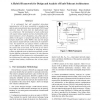Free Online Productivity Tools
i2Speak
i2Symbol
i2OCR
iTex2Img
iWeb2Print
iWeb2Shot
i2Type
iPdf2Split
iPdf2Merge
i2Bopomofo
i2Arabic
i2Style
i2Image
i2PDF
iLatex2Rtf
Sci2ools
105
click to vote
DATE
2006
IEEE
2006
IEEE
A hybrid framework for design and analysis of fault-tolerant architectures
It is anticipated that self assembled ultra-dense nanomemories will be more susceptible to manufacturing defects and transient faults than conventional CMOS-based memories, thus the need exists for fault-tolerant memory architectures. The development of such architectures will require intense analysis in terms of achievable performance measures– power dissipation, area, delay and reliability. In this paper, we propose and develop a hybrid automation framework, called HMAN, that aids the design and analysis of fault-tolerant architectures for nanomemories. Our framework can analyze memory architectures ifferent levels of the design abstraction, namely the system and circuit levels. To the best of our knowledge, this is the first such attempt at analyzing memory systems at different levels of abstraction and then correlating the different performance measures. We also illustrate the application of our framework to self-assembled crossbar architectures by analyzing a hierarchical faul...
DATE 2006 | Fault-tolerant Architectures | Fault-tolerant Memory Architectures | Hardware | Memory Architecture |
Related Content
| Added | 10 Jun 2010 |
| Updated | 10 Jun 2010 |
| Type | Conference |
| Year | 2006 |
| Where | DATE |
| Authors | Debayan Bhaduri, Sandeep K. Shukla, Deji Coker, Valerie Taylor, Paul Graham, Maya Gokhale |
Comments (0)

